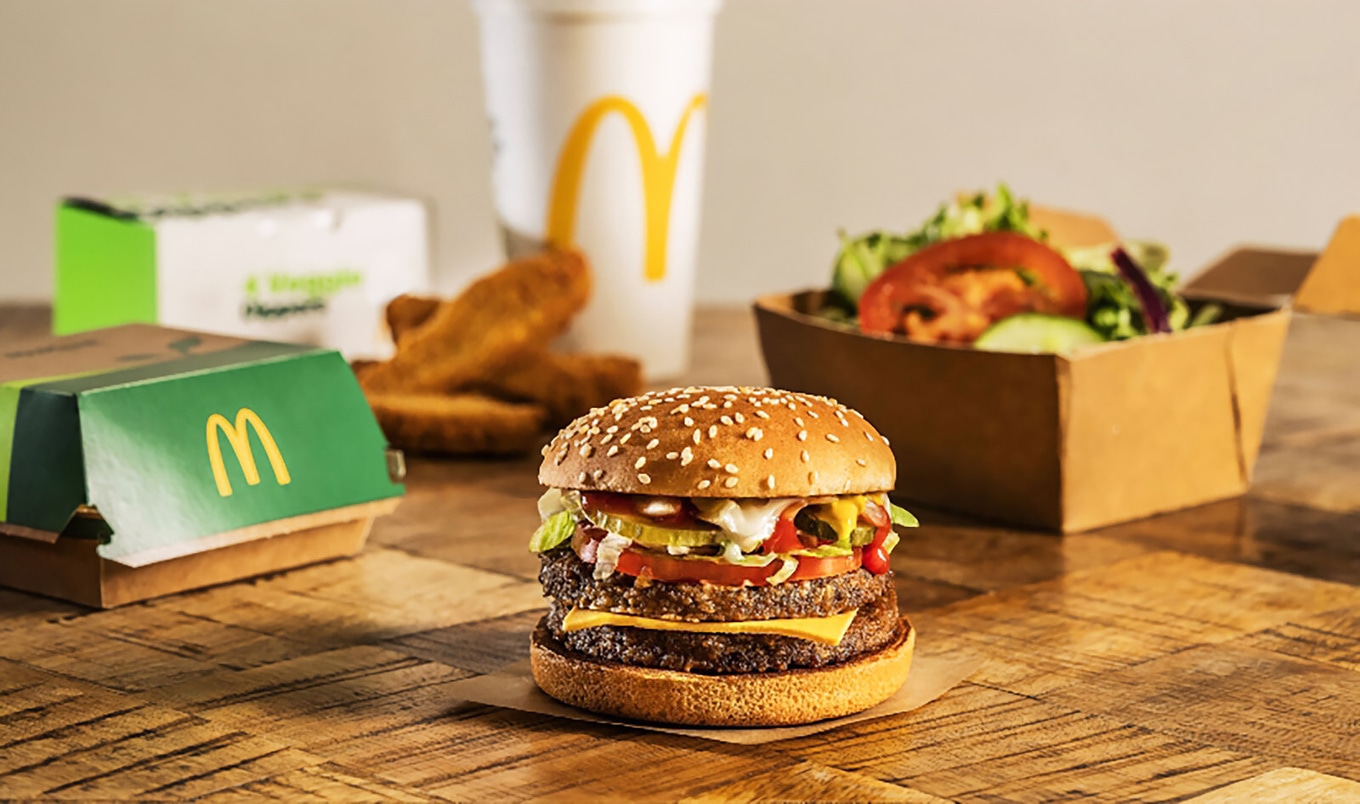Right now, if you were to walk down any British high street, you could step into most restaurants and find a vegan menu. Many independent eateries offer delicious plant-based options, sure, but vegan food is not on the fringes of society in the UK. It’s in McDonald’s, KFC, Burger King, Pizza Hut, Subway, Starbucks, Krispy Kreme, and Greggs. Don’t fancy fast food? From Aldi to Tesco to Sainsbury’s, every single one of the biggest grocery store chains in the country offers its own range of plant-based food. And we’re not just talking tofu (however great it may be), we’re talking vegan bacon, tuna, ham, steak, nuggets, burgers, sausages, and more. It’s kind of a plant-based paradise.
Things in the US are improving, but the situation isn’t quite the same. A perfect example is the McDonald’s menu. In the UK, you can order a vegan McPlant meal, with a side of fries and veggie fingers. In the US? You can’t even get the fries, because they’re cooked in beef flavoring. This is not to say that America doesn’t have much to be proud of when it comes to plant-based innovation. It’s just that when it comes to eating that same vegan food, the UK seems to have more of an insatiable appetite for it. After all, the plant-based beef patty in the UK’s beloved McPlant is made by Beyond Meat, a California company.
 McDonald’s UK
McDonald’s UK
The difference is partly due to size. The UK is significantly smaller than the US—11 states in the US could fit the entire country inside them. This makes it far easier for organizations like Veganuary—which encourages people to give up animal products for one month—to gain momentum and keep it up. You can find out more on this below, as well as some of the other reasons why the UK (and other countries in Europe) are leading the way in terms of growth in the plant-based market. We spoke with two British experts, Matthew Glover, activist, entrepreneur, and co-founder of Veganuary, and Maisie Stedman, PR officer for The Vegan Society, to find out more.
VegNews: Why do you think the plant-based food industry is bigger than ever in the UK right now?
Matthew Glover: I believe Veganuary has played a pivotal role in the UK’s plant-based food industry’s significant growth over the last decade. Retailers, restaurants, and food manufacturers have wholeheartedly embraced this initiative, introducing new products and menu items. The establishment of a month dedicated to veganism and plant-based diets, which has gained widespread recognition, has profoundly transformed the food sector in the UK.
Maisie Stedman: The reasons behind the rise of veganism are numerous. A more positive portrayal in the media has contributed to its changing image; documentaries on the shocking realities of animal agriculture have gained prominence; peaceful activists are educating the public about veganism on the streets and in schools; supermarkets and restaurants are launching convenient, tasty vegan food options; delicious vegan recipes have multiplied online and on social media as society becomes increasingly health-conscious; and top vegan athletes keep proving that you can be fit and healthy on a plant-based diet.
“Vegan food has transitioned into the mainstream.” –Matthew Glover
VN: It’s true that there are more vegans than ever in the UK. But it’s not just vegans driving the trend toward plant-based foods in the UK anymore. It’s meat-eaters choosing more flexitarian food choices, too. Why is that?
MG: Most restaurants now offer vegan options or even separate vegan menus. Despite some recent rationalization, supermarkets continue to provide a wide array of plant-based choices.
MS: Discourse around the environmental impact of consuming meat has increased in recent years, and many people are choosing to cut down on animal products as a result. You can now walk into any supermarket and be greeted by a huge range of plant-based products or walk into any restaurant and be presented with an exciting vegan menu.
“The UK-based campaign Veganuary has had a huge impact on the number of people trying veganism both in the UK and globally.” —Maisie Stedman
VN: The US’ plant-based food industry is growing, too, there’s no doubt. But across the Atlantic, it doesn’t seem to have taken hold in quite the same way as it has in the UK. Why is there such a difference?
MG: The advocacy for dietary change on a per capita basis has been more subdued in the US. Veganuary has not had the same transformative effect, partly due to the country’s vast size and limited resources. The meat lobby’s influence is also stronger. Misinformation campaigns, ag-gag laws, and legal challenges pose significant obstacles to the plant-based food industry. However, the US leads in food-technology innovation, with companies like Beyond Meat, Impossible Foods, and Eat Just outpacing their UK and European counterparts.
 Climax Foods
Climax Foods
VN: The US is definitely a leader in terms of plant-based innovation. From scallops to the cheesiest vegan cheese, the country is seriously up on plant-based product development. But in Europe, plant-based food-technology is also gaining pace and the vegan lifestyle is becoming more popular. Which countries would you say are standing out right now?
MG: Germany, Denmark, and the Netherlands are making significant strides in embracing plant-based foods and innovation. While challenges remain, the conversation around meat reduction appears less polarized in these countries. There is a growing acceptance at both societal and institutional levels that reducing meat consumption is necessary.
VN: This is reflected in the fact that veganism and flexitarianism lifestyles are on the up, too.
MS: Veganism is growing all across Europe. In 2023, according to a report by Meticulous Research, 2.6 million people in Europe are now vegan, representing 3.2 percent of the European population, and, since 2020, according to The Good Food Institute, plant-based food sales in Europe have increased by 22 percent. According to the Smart Protein Project, the largest flexitarian populations are found in Germany (40 percent) and Austria (37 percent), where being an omnivore is no longer the norm. The Netherlands follows with 35 percent of consumers identifying as flexitarians.
VN: The statistics are promising. And finally, as well as certain countries, certain generations are leading the way, too. Would you agree?
MG: Younger generations, particularly those residing in urban areas, are at the forefront of the change in the UK. Similar to global trends, individuals who are socially liberal and align with environmental and social justice causes are propelling the growth of plant-based foods.
For more on plant-based food, read:
JUMP TO ... Latest News | Recipes | Guides | Health | Subscribe









